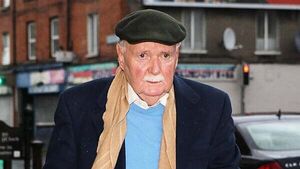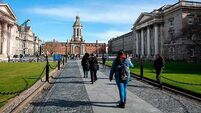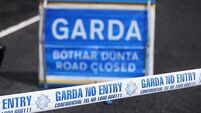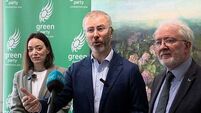Lengthy civil case against former banker Michael Fingleton concludes at High Court

Ann O'Loughlin
The lengthy civil case against former banker Michael Fingleton, who is alleged to have negligently mismanaged the Irish Nationwide Building Society (INBS) which collapsed after failed financial and property "gambles", has finally concluded at the High Court.
Mr Fingleton, 87, who is in ill health after a stroke, ran the building lender from 1971 to 2009, as managing director and chief executive. At its height in 2007, it had reported assets of €16 billion but was a high-profile casualty of the financial crisis of 2008.
Mr Fingleton's ill health meant he was unable to give any evidence in the case, which concluded on Friday.
Liquidators for the Irish Banking Resolution Corporation (IBRC) took the case against Mr Fingleton, who denied the allegation of negligent mismanagement.
The losses had been estimated by IBRC at €6 billion relating to property loans. However, only a figure of around €250 million in damages was being pursued by IBRC, relating to five loans made by INBS, allegedly approved by Mr Fingleton.
Mr Fingleton, acting through his wife, Eileen Fingleton and son Michael Fingleton Jnr, under their powers of attorney, made several attempts through court challenges and appeals to halt the case, originally taken in 2012, but ultimately failed.
Closing submissions in the case concluded today at the High Court with Mr Justice Michael Quinn informing all parties he is reserving judgment but would endeavour to deliver his ruling as soon as possible.
Barrister Lyndon MacCann SC for the plaintiff had said it was IBRC's case that INBS operated on a speculation that property could only "go up, and up, and up, and up" and that a "blasé" attitude had been taken to warning letters from auditors and the financial regulator.
Counsel had said the claim against Mr Fingleton was for damages for alleged "profound mismanagement" of INBS for whom he was the equivalent of the chief executive and director for 38 years until his exit in 2009, "or, the boss".
Counsel had submitted the claim against Mr Fingleton was "enormous" and that compensation was sought for "huge losses" for the alleged "negligent mismanagement in the stewardship of the society over decades".
The five loans "approved" by Mr Fingleton relate to property development projects in Ireland, France and the UK between 2006 and 2008, counsel had said.
Mr MacCann had said Mr Fingelton "gambled" with the society's money when he himself allegedly approved "speculative, risky" commercial loans, which sometimes had already been greenlit by him before they were taken before the board of directors, on which he also sat.
Counsel for the Fingleton side claimed there had been "black holes after black holes" in the case, amounting to a lack of evidence that meant there could be no adverse finding against Mr Fingleton.
Solicitor Niall Clerkin had said there were "large substantial tracts of documents missing" in the case and that important witnesses had not been called by the plaintiff. Mr Clerkin said this ultimately amounted to an "unfairness" against the Fingleton side's ability to defend the case.
The case began on May 6 last and involved 41 days of evidence and submissions before Mr Justice Quinn and involved some 1.6 million documents of discovery.
The Fingleton side was represented by solicitors Kevin Lynch and Mr Clerkin of Clerkin Lynch LLP, while senior counsels John D Fitzgerald and Mr MacCann, instructed by McCann Fitzgerald Solicitors, represented the IBRC side.
The State-run National Asset Management Agency (Nama) took over INBS' commercial property loans in 2010. The following year, the government merged it with Anglo Irish Bank and established IBRC to take on the finances of both lenders.
Mr Fingleton was a prominent presence in Irish business during the Celtic Tiger and was reported to have been worth around €75 million in 2006; however his son has told the courts that his father is reduced to €25,000 in two personal bank accounts and has outstanding judgment debts of more than €10.7 million.




